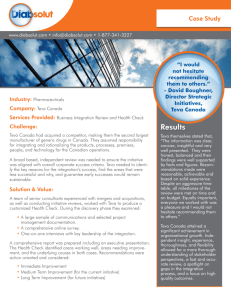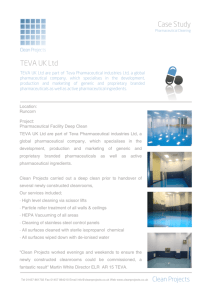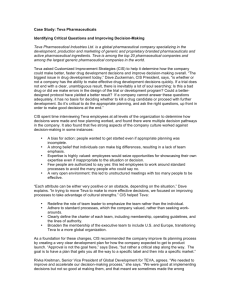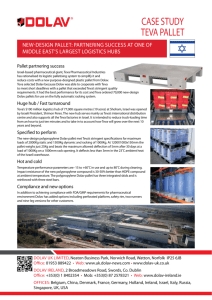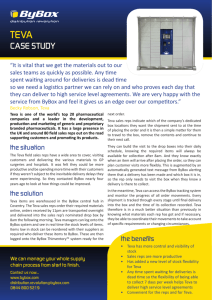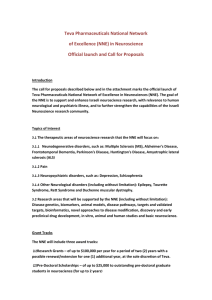Teva - Smart Woman Securities
advertisement
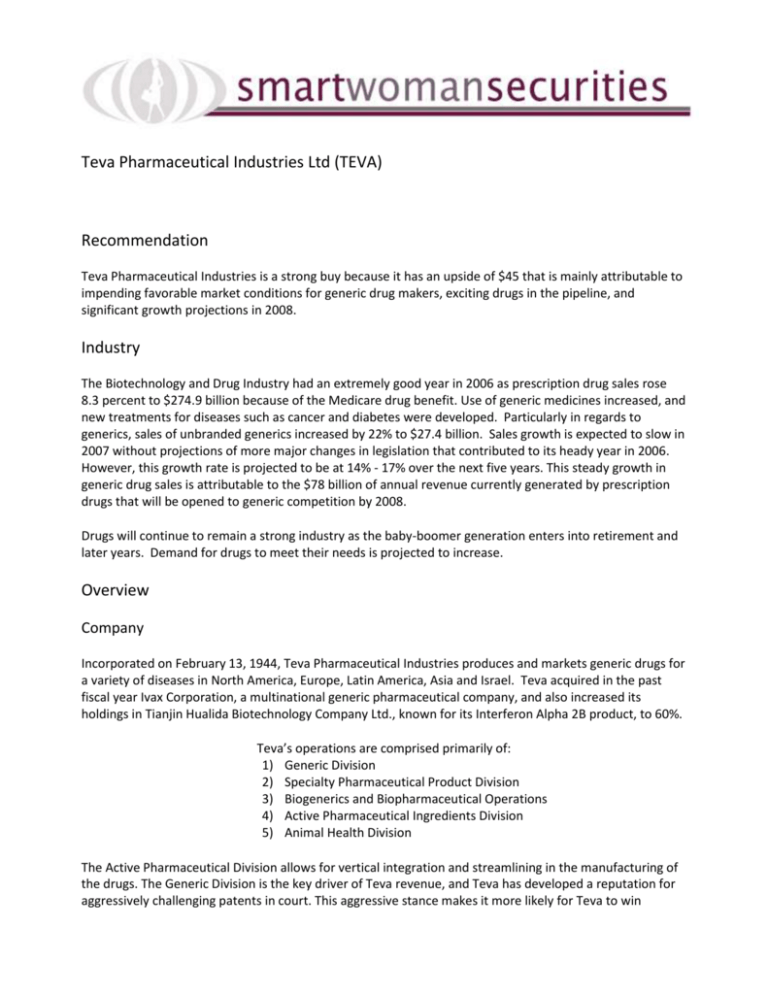
Teva Pharmaceutical Industries Ltd (TEVA) Recommendation Teva Pharmaceutical Industries is a strong buy because it has an upside of $45 that is mainly attributable to impending favorable market conditions for generic drug makers, exciting drugs in the pipeline, and significant growth projections in 2008. Industry The Biotechnology and Drug Industry had an extremely good year in 2006 as prescription drug sales rose 8.3 percent to $274.9 billion because of the Medicare drug benefit. Use of generic medicines increased, and new treatments for diseases such as cancer and diabetes were developed. Particularly in regards to generics, sales of unbranded generics increased by 22% to $27.4 billion. Sales growth is expected to slow in 2007 without projections of more major changes in legislation that contributed to its heady year in 2006. However, this growth rate is projected to be at 14% - 17% over the next five years. This steady growth in generic drug sales is attributable to the $78 billion of annual revenue currently generated by prescription drugs that will be opened to generic competition by 2008. Drugs will continue to remain a strong industry as the baby-boomer generation enters into retirement and later years. Demand for drugs to meet their needs is projected to increase. Overview Company Incorporated on February 13, 1944, Teva Pharmaceutical Industries produces and markets generic drugs for a variety of diseases in North America, Europe, Latin America, Asia and Israel. Teva acquired in the past fiscal year Ivax Corporation, a multinational generic pharmaceutical company, and also increased its holdings in Tianjin Hualida Biotechnology Company Ltd., known for its Interferon Alpha 2B product, to 60%. Teva’s operations are comprised primarily of: 1) Generic Division 2) Specialty Pharmaceutical Product Division 3) Biogenerics and Biopharmaceutical Operations 4) Active Pharmaceutical Ingredients Division 5) Animal Health Division The Active Pharmaceutical Division allows for vertical integration and streamlining in the manufacturing of the drugs. The Generic Division is the key driver of Teva revenue, and Teva has developed a reputation for aggressively challenging patents in court. This aggressive stance makes it more likely for Teva to win exclusivity, which is the optimal condition when marketing and selling generic drugs. Teva has a strong hold on the generic market, particularly in the United States, Europe, and Canada. Holding over $5.3 billion in sales, Teva is the market share leader in the generic pharmaceutical market and is expected to continue to increase its market share. Management Position Eli Hurvitz Phillip Frost Shlomo Yanai Dan Suesskind Chairman of the Board Vice Chairman of the Board CEO CFO Time with Company Experience Exposure Key Points Since 1973 Former Teva President and CEO (Over 25 Years), Chairman of the Board of the Israel Democracy Institute, Chairman of Israel Export Institute, Chairman of the Board at Bank Leumi Ltd Pharmaceutical Industry, Politics, Finance Exposure to Politics and Finance Jan-06 CEO, President, and Chairman of the Board of Ivax Corporation (acquired by Teva in January 2006), Director of Continucare Corporation (healthcare), and Director of Ladenburg Thalmann Financial Services, Inc. Pharmaceutical Industry, Healthcare, Finance Familiarity with Ivax Corporation and allegiance to Teva should facilitate transition very well. Since March 1, 2007 Former CEO of and President of Makhteshim Agan, Head of IDF's Southern Command and Head of Planning Generic companies, Recognized by Dun & Bradstreet as one of Israel's Ten Best Business Leaders Fairly new to business management, but Makhteshim Agan was the largest generic company for crop protection, and he succeeded with them. Since 1978 Former Consultant and Securities Analyst with International Consultants Ltd. , Director of Teva, Director of ESC Medical Systems, Director of First International Bank, Member of Investment Advisory Committee of Jerusalem Foundation Finance, Pharmaceuticals, and Medical Industry Significant Experience in Finance There is wide speculation on why Israel Makov (Yanai’s predecessor) would have left his prestigious position as CEO of the world’s largest generic drugs company after a mere 4.5 years. Some believe his resignation could have been prompted by the 30% loss in Teva share value over the last year preceding his resignation, and the lack of the board’s faith in him to be able to increase share value. Others believe he may have taken too much credit for Teva’s successes, like the acquisition of Ivax Corporation, without taking responsibility for the failures. Though Yanai was brought in from an industry other than the generics drug company, he is widely recognized as a strong manager and officer. Since Yanai’s instatement as CEO on March 1, 2007, Teva share value has risen from $35 to its current price of $38. Teva’s current officers possess a breadth of knowledge in the Pharmaceutical Industry, Politics, Health, and Finances. This implies that they are competent of growing the company within the industry, while being cognizant of politics and of the effects of their actions on stock price. Competition 5-Year Sales Growth Rate PE Ratio Comparison NVO - Novo Nordisk AS ZMH - Zimmer Holdings, Inc. SGP - Schering Plough Co. ESALY - Eisai Co., Ltd PEG Ratio Competitor Comparisons Income Statement Margins and Profitability Metrics TEVA NVO SGP ESALY ZMH Net Profit Margin 20.05% 16.44% 10.58% 10.17% 26.22% Operating Margin 16.50% 20.10% 9.05% Return on Average Equity 16.99% 23.68% 16.67% 12.66% 20.19% 26,670 23,172 7.11% 15.65% 36.24% Return on Average Assets Employees 15.64% 14% - 9.05% 9,081 16.53% 6,900 Technical Analysis TEVA’s Performance TEVA is a steadily growing stock and is projected to maintain its growth into the future due to the aforementioned projected increases in earnings. Rallying of stock price prior to the releases of quarterly earnings statements and the subsequent adjustment of price after the earnings reports, may explain, in part, the minor fluctuations in Teva’s stock price. TEVA’s Performance Relative to S&P 500 Teva has steadily outperformed the market over the past five years. Even if the economy were to weaken, demand for Teva’s products – generic drugs – will hardly be affected; medication is absolutely necessary, regardless of one’s economic status. Further, demand for generics may increase in times of economic downturns, because more individuals will be unwilling to pay the premium for brand name drugs. Financial Statement Analysis (First Quarter 2007 Results to be released on Wednesday, May 2, 2007) Income Statement Quarterly (Dec '06) Annual (2006) Annual (2005) Total Revenue 2,277 8,408 5,250 Gross Profit 1,102 4,259 2,480 Operating Income 375 801 1,312 Net Income 459 546 1,072 7,640 7,640 5,505 20,471 20,471 10,387 Total Current Liabilities 4,071 4,071 2,260 Total Liabilities 9,329 9,329 4,345 Balance Sheet Total Current Assets Total Assets Total Equity 11,142 11,142 6,042 1.88 - - 9.05% 3.57% 3.57% ROE 4.9% - - Return on Assets 2.7% - - .41 - - Current Ratio Return on Average Assets Debt/Common Equity Ratio Cash Flow Net Income/Starting Line 459 546 1,072 Cash from Operating 764 2,058 1,370 Cash from Investing 33 -4,058 -537 Cash from Financing -325 2,024 -312 -2,148 - - Net Free Cash Flow Key Stats & Ratios Net Profit Margin 20.05% 6.55% 6.55% Operating Margin 16.50% 9.53% 9.53% Financials indicate significant growth in the company with an increasing operating cash flow. The significant increase in net profit margin indicates high earnings per dollar of sales, and the higher operating margin signals efficiency in the company. Free cash flow could have been negative in 2006 because of the acquisition of IVAX Corporation. Valuation Company Industry Sector P/E Ratio (TTM) P/E High - Last 5 Yrs. P/E Low - Last 5 Yrs. Beta Price to Sales (TTM) Price to Book (MRQ) Price to Cash Flow (TTM) Price to Free Cash Flow (TTM) S&P 500 55.77 NM NM 0.56 2.57 1.94 NM 30.8 48.49 17.5 0.95 8.45 6.4 2.92 25.82 47.36 17.18 0.73 5.23 5.26 19.23 19.9 36.37 14.48 1 2.77 3.88 13.97 15.03 40.96 34.46 32.57 Teva’s relatively high P/E ratio relative to the industry indicates that the company is priced higher than its counterparts with the same earnings. However, this optimism is justified by the company’s strong pipeline and projected performance in 2007 and 2008. Also, Teva sports a relatively low Price-to-Book ratio, indicating that the company could actually be undervalued relative to its assets. Using a fairly conservative PE multiple of 17x, and the earnings suggested in the 2007 Guidance Reports, the price target is set at $45. Investment Risks Legislation Pharmaceutical companies always stand to gain or lose significantly according to changes in legislation. The political landscape is currently fairly unclear with the presidential race just beginning. Of particular note, generic drug companies are currently attempting to have a law passed that would allow them to create and market generic versions of biotech drugs, like those of Amgen and Genentech. It is facing considerable resistance, particularly because it is unclear whether or not the companies can recreate the complex drugs safely. If passed, this law can lead to significant gains in the generic drug sector. Teva’s strong research and development puts it in an optimal position to gain from this opportunity, if made available. Litigation Risks There is always some significant risk of litigation associated with every pharmaceutical company. As case in point, Teva is currently involved in a trial after ProNeuron accused it of executing clinical trials of a molecule for neurodegenerative diseases that were not suitable according to scientific standards. The case has yet to be developed. Despite the significant risk of litigation, if the company is managed correctly, it can remain strong despite many allegations from competitors. Investment Opportunities Industry Conditions Teva is expected to profit significantly when numerous major drugs lose their patents in the next two years. Teva is particularly well-poised to take advantage of the opportunity because of its international presence, aggressive tactics, and especially strong Research and Development division. Further, the industry is expected to grow significantly because of the increasing medical needs of the baby-boomer generation. Optimistic growth targets in 2008 Earnings per share targets for 2008 and 2009 are between $2.50 and $3.00. Considering the strength of the company, and its aforementioned opportunities for growth, these targets are reasonable. Comparison of Teva’s Estimated and Actual Quarterly Earnings. Promising Pipeline Product Division Indication Status Copaxone®(glatiramer acetate for Injection) Multiple Sclerosis RelapsingRemitting MS (R-R MS) Approved world-wide. Phase IIIb/IV studies on-going, including a study in CIS patients , a study with a daily 40mg dose and various combination/induction protocols Laquinimod Multiple Sclerosis Relapsing MS Phase III Azilect® (rasagiline mesylate) Neurological/ Neurodegenerative Diseases Parkinson's disease Approved world-wide as a symptomatic treatment for both early patients, as monotherapy, and advanced patients, as adjuncive treatment to levodopa. A Phase IIIb to show effect on disease progression is on-going Glatiramer acetate Neurological/ Neurodegenerative Diseases ALS Phase II Rasagiline mesylate Neurological/ Neurodegenerative Diseases Alzheimer's disease Phase II Talampanel Neurological/ Neurodegenerative Diseases ALS Phase II Edratide Auto-Immune/ Inflammatory Diseases Lupus Phase II in SLE TV-3813 Auto-Immune/ Inflammatory Psoriasis Pre-clinical Diseases Stem Ex® (with GamidaCell) Oncology Talampanel Oncology Hematooncological indications Glioma Phase III Phase II Further, the court decision regarding whether Teva will have exclusive, or co-exclusivity with Dr. Reddy's laboratories, for a generic version of Aciphex (used in the treatment of upper gastrointestinal disorders) to be launch in 2007, will be announced in mid-May. If successful, this brand sale is expected to total $1.3 billion. Recommendation Teva is a strong buy because of its increasing business mix, improving industry conditions, and optimistic and practical growth targets in 2008. It is recommended that Smart Woman Securities acquire Teva at its current price of $38 to sell at the target price of $45 for an 18.4% return.
